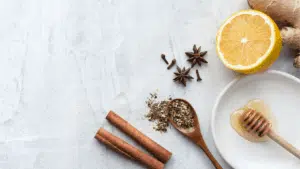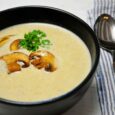
Feed A Cold, Starve a Fever
There may well be some truth to the old adage, ‘feed a cold, starve a fever’, based on findings of a recent study. This research – albeit using animals – has found that if you feed a viral infection, you’re likely to do quite well, but not so if you continue to eat in the presence of a bacterial infection.
Considering what we know about these two micro-organisms, this makes sense. Bacteria feed very well on sugar. You can make sugar (glucose) out of every food that you eat. Bacterial also rather like iron and zinc, which we get from our food as well. So feeding yourself also feeds the infection. Viruses, on the other hand, are easier for us to combat if we have good levels of vitamin C and zinc. Vitamin C concentrates in certain types of white blood cells that are mobilised in a viral infection.
How do I know if I have a Viral or a Bacterial Infection?
If you have a cold or the ‘flu you have a virus. Viral infections tend to be associated with some congestion and clear, runny noses. Of course there are also more severe viral infections (such as chicken pox, viral meningitis etc and others). The first part of a chicken pox infection is a cold up to 2-3 weeks before the spots appear. Viral mucous can be blood-stained when inflammation is high. It is not usual to get a fever with a cold (hence the “cold”) but influenza is commonly associate with fever, fatigue and body aches.
Bacterial infections produce pus, which is mucous mixed in with both live and dead bacteria, immune cells and other debris from the “battle”. This always has a colour. Bacterial infections can be quite severe and you can get a fever quite early in the infection.
What Can I do if I get an Infection?
The job of the fever (if you get one) is to activate your immune system. Avoiding doing things to suppress the fever (such as taking Panadol) is very important. If your body seems to be somewhat slow to mount a fever, you can aid it using the recipe below.
If you have a bacterial infection, stop eating regular food, especially inflammatory food such as grains, animal protein and dairy products. Dairy products and bananas are also considered “damp & slimy” foods – encouraging the development of mucous, within which bacteria can grow and flourish. Drink plenty of water and home-made chicken broth for sustenance. We recommend Allicin Max capsules. A short “acute” appointment will aid us to advise you the appropriate dose for you to take depending on your individual circumstances. This can be arranged by SKYPE and we can send you any recommended remedies by overnight courier. If you seem to be susceptible to frequent infections you may benefit from a personalised herbal formula, depending on the type and location of the infection. Please phone the clinic to arrange an acute (15 minute) SKYPE appointment so you can get well without having to leave home.
If you have a viral infection, enjoy fresh, nutritious fruit and vegetables. Stop all dairy products and generally keep your intake of animal food low. We recommend high dose, highly absorbable vitamin C and extra zinc.
Our Herbal Defense liquid herbal medicine is a great preventative and early-intervention treatment.
For sore throats, use 2-3 drops of Kunzea ambigua oil in 1/4 cup of water, mix together well. Gargle with this several times a day. Swallow ONE mouthful at the end of gargling. This will alleviate the pain and is also antimicrobial, to aid your immune defenses at the site of the infection.
Immune-Boosting Super-Drink
In a large mug, place the following:
- 1 clove of crushed garlic
- 1/2 – 1 tsp of powdered ginger (or 2 tsp fresh grated ginger)
- A pinch of cayenne pepper
- 1 tblsp of honey (preferably manuka honey)
- Juice of one lemon
Top up with boiling water. Stir until the honey has dissolved. Drink it as hot and as quickly as you can, preferably after having a hot bath or shower. Jump into bed with lots of blankets. The goal: Heat your body up to kick-start your immune system.











